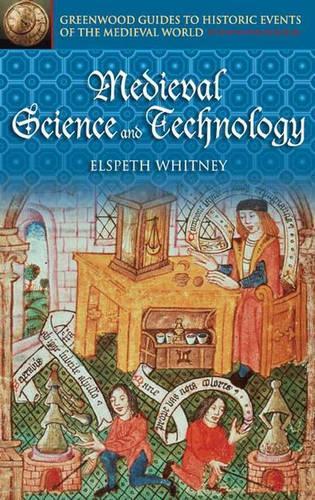
Medieval Science and Technology
(Hardback)
Publishing Details
Medieval Science and Technology
By (Author) Elspeth Whitney
Bloomsbury Publishing PLC
Greenwood Press
30th October 2004
United States
Classifications
General
Non Fiction
609
Physical Properties
Hardback
304
Width 156mm, Height 235mm
595g
Description
Medieval practitioners of the "natural arts" and "mechanical arts" - as scientists and craftsmen of the day called their trades - were powerfully influenced by Christianity and by ancient ideas dating back to Plato, Aristotle, and Ptolemy. While medieval science and technology did not seek to overthrow the prevailing views of the time, their accomplishments did lay the groundwork for the scientific revolution and European global expansion of the early modern age. The book begins by introducing the basic concepts of the Classical Tradition, and explains how these ideas were promulgated by the ancient Greeks, were preserved and developed by the great Muslim scholars of the early middle ages, and finally transmitted into western Europe as that region began to grow and expand around 1100 C.E. Aristotle's natural philosophy is then given an extended treatment, since his descriptions of the natural world provided the intellectual jumping-off point used by every person grappling with the nature of nature during the Middle Ages. Specific avenues of inquiry such as Astronomy and Astrology, Optics, Chemistry and Alchemy, Zoology, Geography, and Medicine are carefully and clearly described on their own terms. Rounding out this engaging work is a discussion of the many innovations from the medieval age, such as mechanical clocks, firearms, and the blast furnace. Biographical sketches provide insight into the lives and accomplishments of twenty men and women whose works profoundly shaped the era's scientific spirit. Eleven annotated key primary documents afford a fascinating glimpse into how the best minds of the time posed their questions and their answers. An annotated timeline, glossary of terms, illustrations, and an annotated bibliography complete the work.
Reviews
[S]urveys major changes of the era, examining the nature and methods of medieval inquiry from astronomy to chemistry and geography, discussing how technological inventions of the times changed world history, and including biographical sketches of the achievements of 20 selected men and women who contributed vastly to the changes in Medieval scientific thinking.-MBR Bookwatch/Donovan's Bookshelf
[W]ould be useful as a very basic course resource or as an introduction to the topic for general audiences. Recommended. General readers; lower-division undergraduates through graduate students.-Choice
Medieval Science and Technology is recommended to libraries as a resource of interest to anyone who wants to know more about the Middle Ages, the development of science and technology, and the background of the astounding development of the West in the modern era.-Catholic Library World
"Surveys major changes of the era, examining the nature and methods of medieval inquiry from astronomy to chemistry and geography, discussing how technological inventions of the times changed world history, and including biographical sketches of the achievements of 20 selected men and women who contributed vastly to the changes in Medieval scientific thinking."-MBR Bookwatch/Donovan's Bookshelf
"Would be useful as a very basic course resource or as an introduction to the topic for general audiences. Recommended. General readers; lower-division undergraduates through graduate students."-Choice
"[W]ould be useful as a very basic course resource or as an introduction to the topic for general audiences. Recommended. General readers; lower-division undergraduates through graduate students."-Choice
"Medieval Science and Technology is recommended to libraries as a resource of interest to anyone who wants to know more about the Middle Ages, the development of science and technology, and the background of the astounding development of the West in the modern era."-Catholic Library World
"[S]urveys major changes of the era, examining the nature and methods of medieval inquiry from astronomy to chemistry and geography, discussing how technological inventions of the times changed world history, and including biographical sketches of the achievements of 20 selected men and women who contributed vastly to the changes in Medieval scientific thinking."-MBR Bookwatch/Donovan's Bookshelf
Author Bio
ELSPETH WHITNEY is Associate Professor of History at the University of Nevada, Las Vegas. She is the author of Paradise Restored: The Mechanical Arts from Antiquity through the 13th Century (1990), and she has published articles in Annals of Scolarship, Medieval Latin Studies, Journal of Women's History, and Women in Medieval Culture.
